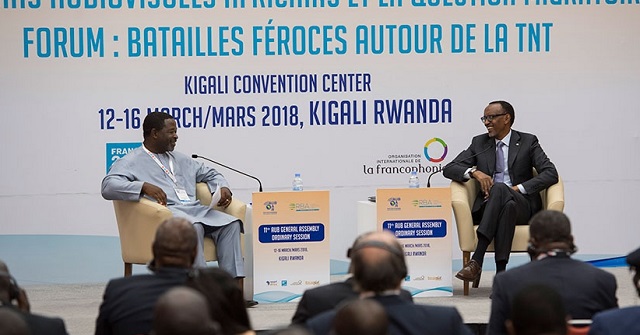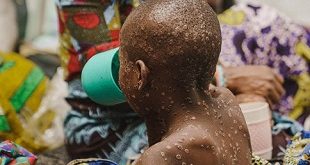
It’s an embarrassment to depend on outsiders
Kampala, Uganda | THE INDEPENDENT & AGENCIES | Africa should start paying its own bills, President Paul Kagame of Rwanda has said. The President was on March 15 speaking at the 11th General Assembly of the African Union of Broadcasting (AUB) where he held an interactive session with representatives of public broadcasters from across the continent.
Rwanda was hosting the 11th General Assembly and Ordinary Session of the African Union of Broadcasting (AUB) from March 12 to 16 under the theme “African audiovisual media and the migratory question.”
The week-long assembly gathered over 150 participants including five ministers of information and communication, around 30 Heads of public broadcasting media, observers, as well as civil society and regulatory bodies.
In an interactive session, President Kagame spoke about a broad range of topics from broadcast rights for African content, to African Union (AU) reforms, to the issue of African migrants to Europe.
Speaking about the benefits of AU reforms, the President emphasized that that it is high time Africa started paying its own bills.
“If you don’t pay your bills you actually end up paying even more than you would, had you paid directly. The one who pays for you in the end owns you,” Kagame said.
He explained that some of the financing initiatives underway for the AU are not new.
“The 0.2% levy has been defended, argued about and is now very clear as one of the ways forward in being able to pay for our activities,” he said.
Among other issues, the five-day meeting, which brought together stakeholders in Africa’s broadcasting sector, ICT regulators and the representatives from the International Telecommunications Union (ITU), sought to deliberate on ways to speed up the process of implementing the digital migration.
The meeting also reviewed media coverage of the migration crisis in Africa and the issue of television broadcasting rights of Africa Cup of Nations (AFCON) in Africa.
During last year’s AFCON, only 13 countries in Africa transmitted it live due to broadcasting rights issues, according to the African Union of Broadcasting.
Speaking specifically on the issue of broadcast rights for African football, Kagame stressed that African leaders – public and private – need to confront the issue and devise ways for Africa to own its story and ways of transmitting it to Africans and beyond.
“It is an embarrassment that the right of Africans playing football in Africa is managed by outsiders. There is nothing to be proud of in such a situation. For how long can we continue this way?” Kagame said.
The President said it is not a question of Africans not having money to own broadcast rights.
“Sometimes it comes down to money. We are told it is very expensive,” he said, “But in the end we pay. “If in the end we pay but very expensively, it actually means money is not our problem,” he said.
He said the actual problem could be that some Africans are happy about the current situation.
“Some Africans don’t find anything wrong with that because those rights are given by people who have made them think like they think even about ourselves,” he said, “But we can deal with that like we have dealt with other problems.”
He said African can invest the same amount paid to foreign-owned companies providing broadcast rights and get its own rights ‘even at a low cost’.
Kagame said Africa also needs an international television channel – like Aljazeera and CNN.
The debate over broadcasting rights is raging just months away from kick-off of the 2018 FIFA World Cup in Russia. In April last year, Zimbabwean billionaire and entrepreneur Strive Masiyiwa, through his Econet Media, paid US$34 million for that free-to-air and subscription TV rights for the tourney that kicks off in June. Econet Media, a subsidiary of Econet Wireless currently covering a large part of Sub-Saharan Africa. Masiyiwa owns Kwese Sports TV.
At the event, the Broadcasting Union also launched an initiative to promote locally produced media content to change the “wrong narrative about Africa”. Under the banner of ‘Rise and Shine Africa’ it will also promote the music and culture of the continent.
On the issue of migration from analogue to digital terrestrial television (DDT) broadcasting, the continental broadcasting union announced on March 12 that the majority of African countries failed to comply with the deadline set for 2015.
Responsibility for the failure was placed mainly on disputes between the regulators and leading broadcasters over digital signal distribution licenses and lack of affordable standard set-top boxes that convert analogue signals to digital, said Gregoire Ndjaka, CEO of the African Union of Broadcasting (AUB), in Kigali, capital city of Rwanda.
“Digital transition process has been difficult for many nations in Africa. Only a few African countries have completed the transition and many more are making the transition,” he said at a continental broadcasting meeting.
The ITU set June 2015 as the global deadline for switching from analogue to DDT broadcasting that allows the introduction of additional services such as digitally-enabled TVs and pay TVs in order to improve television viewership across the globe.
“We are looking at ways to speed up the implementation process because digital broadcasting has the potential to improve both the quantity and quality of what is available on TV and improve television viewership,” Ndjaka said.
The African Union of Broadcasting (AUB) is a professional body composed of national public broadcasters including both Radio and Television with a membership of 52 countries.
The organisation groups state-owned public broadcasters in Africa and does mainly advocacy work but also creates a platform where these institutions discuss issues of mutual interests that cut across geographical boundaries.
The Summit which was held at the Kigali Convention Centre opened on March 12 and closed on March 16.
 The Independent Uganda: You get the Truth we Pay the Price
The Independent Uganda: You get the Truth we Pay the Price



